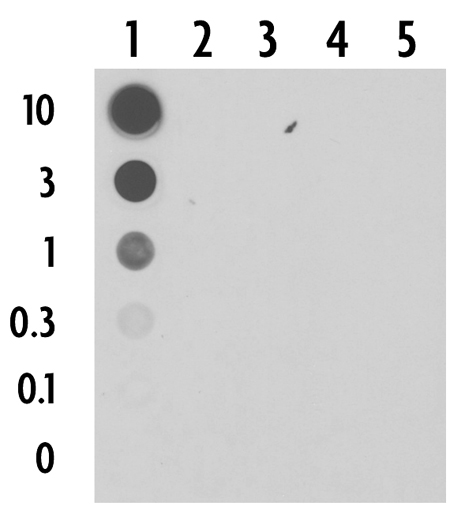5-Carboxylcytosine (5-caC) antibody (pAb)
Host / Isotype
Rabbit / IgG
Reactivity
Not Species Specific
Applications
Dot Blot, ICC, IF
Cat No : 61229,61230 61229
Synonyms
验证数据展示
产品信息
| Tested Applications |
Dot Blot, ICC, IF
Applications Validated by Active Motif: DB: 0.5 - 2 ug/ml dilution |
| Tested Reactivity | Not Species Specific |
| Host / Isotype | Rabbit / IgG |
| Class | Polyclonal |
| Type | Antibody |
| Modification | Methylated |
| Immunogen | This 5-Carboxylcytosine antibody was raised against 5-carboxylcytidine conjugated to KLH and recognizes 5-carboxylcytosine. |
| Full Name | 5-Carboxylcytosine (5-caC) antibody (pAb) |
| Synonyms | 5-carboxylcytidine, 5-carboxylcytosine, 5-fC, 5fc, TET, dna methylation, carboxylcytosine, stem cell, stem cells, embryogenesis, 5-cac, 5cac, sample |
| Molecular weight | |
| GenBank accession number | N/A | RRID | AB_2793559 | Purification Method | Protein A Chromatography |
| Buffer | Purified IgG in PBS with 30% glycerol and 0.035% sodium azide. Sodium azide is highly toxic. |
| Storage | Some products may be shipped at room temperature. This will not affect their stability or performance. Avoid repeated freeze/thaw cycles by aliquoting items into single-use fractions for storage at -20°C for up to 2 years. Keep all reagents on ice when not in storage. |
背景介绍
DNA methylation is an epigenetic event in which DNA methyltransferases (DNMTs) catalyze the reaction of a methyl group to the fifth carbon of cytosine in a CpG dinucleotide. This modification helps to control gene expression and is also involved in genomic imprinting, while aberrant DNA methylation is often associated with disease. 5-methylcytosine is a modified base that is found in the DNA of plants and vertebrates. A second type of DNA methylation exists, 5-hydroxymethylcytosine (5-hydroxy methylcytosine, 5-hmC). This results from the enzymatic conversion of 5-methylcytosine into 5-hydroxymethylcytosine by the TET family of cytosine oxygenases. Iterative activity of TET on 5-hydroxymethylcytosine results in the conversion of 5-hmC into 5-formylcytosine and 5-carboxylcytosine. An increase in levels of 5-formylcytosine and 5-carboxylcytosine are detected in the mouse male pronucleus following fertilization, which is gradually diluted by DNA replication.

